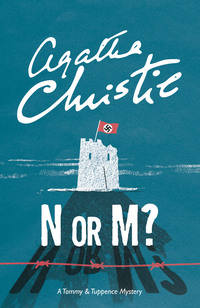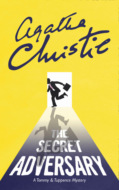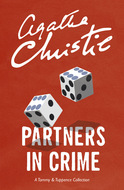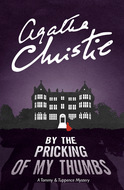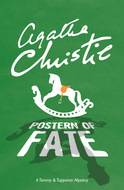Raamatut ei saa failina alla laadida, kuid seda saab lugeda meie rakenduses või veebis.
Loe raamatut: «N or M?»

N or M?

Published by HarperCollinsPublishers Ltd
1 London Bridge Street
London SE1 9GF
First published in Great Britain by
Collins 1941
Agatha Christie® Tommy & Tuppence® N or M?™
Copyright © 1941 Agatha Christie Limited. All rights reserved.
Cover layout design © HarperCollinsPublishers Ltd 2015 Cover illustration based on photograph © 2014 Endor Productions. Stills photographer: Robert Viglasky
Agatha Christie asserts the moral right to be identified as the author of this work.
A catalogue copy of this book is available from the British Library.
This novel is entirely a work of fiction. The names, characters and incidents portrayed in it are the work of the author’s imagination. Any resemblance to actual persons, living or dead, events or localities is entirely coincidental.
All rights reserved under International and Pan-American Copyright Conventions. By payment of the required fees, you have been granted the non-exclusive, non-transferable right to access and read the text of this e-book on screen. No part of this text may be reproduced, transmitted, down-loaded, decompiled, reverse engineered, or stored in or introduced into any information storage and retrieval system, in any form or by any means, whether electronic or mechanical, now known or hereinafter invented, without the express written permission of HarperCollins.
Source ISBN: 9780007590612
Ebook Edition © Jan 2015 ISBN: 9780007422616
Version: 2017-04-17
Contents
Cover
Title Page
Copyright
CHAPTER 1
CHAPTER 2
CHAPTER 3
CHAPTER 4
CHAPTER 5
CHAPTER 6
CHAPTER 7
CHAPTER 8
CHAPTER 9
CHAPTER 10
CHAPTER 11
CHAPTER 12
CHAPTER 13
CHAPTER 14
CHAPTER 15
CHAPTER 16
Also by Agatha Christie
About the Publisher
CHAPTER 1
Tommy Beresford removed his overcoat in the hall of the flat. He hung it up with some care, taking time over it. His hat went carefully on the next peg.
He squared his shoulders, affixed a resolute smile to his face and walked into the sitting-room, where his wife sat knitting a Balaclava helmet in khaki wool.
It was the spring of 1940.
Mrs Beresford gave him a quick glance and then busied herself by knitting at a furious rate. She said after a minute or two:
‘Any news in the evening paper?’
Tommy said:
‘The Blitzkrieg is coming, hurray, hurray! Things look bad in France.’
Tuppence said:
‘It’s a depressing world at the moment.’
There was a pause and then Tommy said:
‘Well, why don’t you ask? No need to be so damned tactful.’
‘I know,’ admitted Tuppence. ‘There is something about conscious tact that is very irritating. But then it irritates you if I do ask. And anyway I don’t need to ask. It’s written all over you.’
‘I wasn’t conscious of looking a Dismal Desmond.’
‘No, darling,’ said Tuppence. ‘You had a kind of nailed to the mast smile which was one of the most heartrending things I have ever seen.’
Tommy said with a grin:
‘No, was it really as bad as all that?’
‘And more! Well, come on, out with it. Nothing doing?’
‘Nothing doing. They don’t want me in any capacity. I tell you, Tuppence, it’s pretty thick when a man of forty-six is made to feel like a doddering grandfather. Army, Navy, Air Force, Foreign Office, one and all say the same thing—I’m too old. I may be required later.’
Tuppence said:
‘Well, it’s the same for me. They don’t want people of my age for nursing—no, thank you. Nor for anything else. They’d rather have a fluffy chit who’s never seen a wound or sterilised a dressing than they would have me who worked for three years, 1915 to 1918, in various capacities, nurse in the surgical ward and operating theatre, driver of a trade delivery van and later of a General. This, that and the other—all, I assert firmly, with conspicuous success. And now I’m a poor, pushing, tiresome, middle-aged woman who won’t sit at home quietly and knit as she ought to do.’
Tommy said gloomily:
‘This war is hell.’
‘It’s bad enough having a war,’ said Tuppence, ‘but not being allowed to do anything in it just puts the lid on.’
Tommy said consolingly:
‘Well, at any rate Deborah has got a job.’
Deborah’s mother said:
‘Oh, she’s all right. I expect she’s good at it, too. But I still think, Tommy, that I could hold my own with Deborah.’
Tommy grinned.
‘She wouldn’t think so.’
Tuppence said:
‘Daughters can be very trying. Especially when they will be so kind to you.’
Tommy murmured:
‘The way young Derek makes allowances for me is sometimes rather hard to bear. That “poor old Dad” look in his eye.’
‘In fact,’ said Tuppence, ‘our children, although quite adorable, are also quite maddening.’
But at the mention of the twins, Derek and Deborah, her eyes were very tender.
‘I suppose,’ said Tommy thoughtfully, ‘that it’s always hard for people themselves to realise that they’re getting middle-aged and past doing things.’
Tuppence gave a snort of rage, tossed her glossy dark head, and sent her ball of khaki wool spinning from her lap.
‘Are we past doing things? Are we? Or is it only that everyone keeps insinuating that we are. Sometimes I feel that we never were any use.’
‘Quite likely,’ said Tommy.
‘Perhaps so. But at any rate we did once feel important. And now I’m beginning to feel that all that never really happened. Did it happen, Tommy? Is it true that you were once crashed on the head and kidnapped by German agents? Is it true that we once tracked down a dangerous criminal—and got him! Is it true that we rescued a girl and got hold of important secret papers, and were practically thanked by a grateful country? Us! You and me! Despised, unwanted Mr and Mrs Beresford.’
‘Now dry up, darling. All this does no good.’
‘All the same,’ said Tuppence, blinking back a tear, ‘I’m disappointed in our Mr Carter.’
‘He wrote us a very nice letter.’
‘He didn’t do anything—he didn’t even hold out any hope.’
‘Well, he’s out of it all nowadays. Like us. He’s quite old. Lives in Scotland and fishes.’
Tuppence said wistfully:
‘They might have let us do something in the Intelligence.’
‘Perhaps we couldn’t,’ said Tommy. ‘Perhaps, nowadays, we wouldn’t have the nerve.’
‘I wonder,’ said Tuppence. ‘One feels just the same. But perhaps, as you say, when it came to the point—’
She sighed. She said:
‘I wish we could find a job of some kind. It’s so rotten when one has so much time to think.’
Her eyes rested just for a minute on the photograph of the very young man in the Air Force uniform, with the wide grinning smile so like Tommy’s.
Tommy said:
‘It’s worse for a man. Women can knit, after all—and do up parcels and help at canteens.’
Tuppence said:
‘I can do all that twenty years from now. I’m not old enough to be content with that. I’m neither one thing nor the other.’
The front door bell rang. Tuppence got up. The flat was a small service one.
She opened the door to find a broad-shouldered man with a big fair moustache and a cheerful red face, standing on the mat.
His glance, a quick one, took her in as he asked in a pleasant voice:
‘Are you Mrs Beresford?’
‘Yes.’
‘My name’s Grant. I’m a friend of Lord Easthampton’s. He suggested I should look you and your husband up.’
‘Oh, how nice, do come in.’
She preceded him into the sitting-room.
‘My husband, er—Captain—’
‘Mr.’
‘Mr Grant. He’s a friend of Mr Car—of Lord Easthampton’s.’
The old nom de guerre of the former Chief of the Intelligence, ‘Mr Carter’, always came more easily to her lips than their old friend’s proper title.
For a few minutes the three talked happily together. Grant was an attractive person with an easy manner.
Presently Tuppence left the room. She returned a few minutes later with the sherry and some glasses.
After a few minutes, when a pause came, Mr Grant said to Tommy:
‘I hear you’re looking for a job, Beresford?’
An eager light came into Tommy’s eye.
‘Yes, indeed. You don’t mean—’
Grant laughed, and shook his head.
‘Oh, nothing of that kind. No, I’m afraid that has to be left to the young active men—or to those who’ve been at it for years. The only things I can suggest are rather stodgy, I’m afraid. Office work. Filing papers. Tying them up in red tape and pigeon-holing them. That sort of thing.’
Tommy’s face fell.
‘Oh, I see!’
Grant said encouragingly:
‘Oh well, it’s better than nothing. Anyway, come and see me at my office one day. Ministry of Requirements. Room 22. We’ll fix you up with something.’
The telephone rang. Tuppence picked up the receiver.
‘Hallo—yes—what?’ A squeaky voice spoke agitatedly from the other end. Tuppence’s face changed. ‘When?—Oh, my dear—of course—I’ll come over right away…’
She put back the receiver.
She said to Tommy:
‘That was Maureen.’
‘I thought so—I recognised her voice from here.’
Tuppence explained breathlessly:
‘I’m so sorry, Mr Grant. But I must go round to this friend of mine. She’s fallen and twisted her ankle and there’s no one with her but her little girl, so I must go round and fix up things for her and get hold of someone to come in and look after her. Do forgive me.’
‘Of course, Mrs Beresford. I quite understand.’
Tuppence smiled at him, picked up a coat which had been lying over the sofa, slipped her arms into it and hurried out. The flat door banged.
Tommy poured out another glass of sherry for his guest.
‘Don’t go yet,’ he said.
‘Thank you.’ The other accepted the glass. He sipped it for a moment in silence. Then he said, ‘In a way, you know, your wife’s being called away is a fortunate occurrence. It will save time.’
Tommy stared.
‘I don’t understand.’
Grant said deliberately:
‘You see, Beresford, if you had come to see me at the Ministry, I was empowered to put a certain proposition before you.’
The colour came slowly up in Tommy’s freckled face. He said:
‘You don’t mean—’
Grant nodded.
‘Easthampton suggested you,’ he said. ‘He told us you were the man for the job.’
Tommy gave a deep sigh.
‘Tell me,’ he said.
‘This is strictly confidential, of course.’
Tommy nodded.
‘Not even your wife must know. You understand?’
‘Very well—if you say so. But we worked together before.’
‘Yes, I know. But this proposition is solely for you.’
‘I see. All right.’
‘Ostensibly you will be offered work—as I said just now—office work—in a branch of the Ministry functioning in Scotland—in a prohibited area where your wife cannot accompany you. Actually you will be somewhere very different.’
Tommy merely waited.
Grant said:
‘You’ve read in the newspapers of the Fifth Column? You know, roughly at any rate, just what that term implies.’
Tommy murmured:
‘The enemy within.’
‘Exactly. This war, Beresford, started in an optimistic spirit. Oh, I don’t mean the people who really knew—we’ve known all along what we were up against—the efficiency of the enemy, his aerial strength, his deadly determination, and the co-ordination of his well-planned war machine. I mean the people as a whole. The good-hearted, muddle-headed democratic fellow who believes what he wants to believe—that Germany will crack up, that she’s on the verge of revolution, that her weapons of war are made of tin and that her men are so underfed that they’ll fall down if they try to march—all that sort of stuff. Wishful thinking as the saying goes.
‘Well, the war didn’t go that way. It started badly and it went on worse. The men were all right—the men on the battleships and in the planes and in the dug-outs. But there was mismanagement and unpreparedness—the defects, perhaps, of our qualities. We don’t want war, haven’t considered it seriously, weren’t good at preparing for it.
‘The worst of that is over. We’ve corrected our mistakes, we’re slowly getting the right men in the right place. We’re beginning to run the war as it should be run—and we can win the war—make no mistake about that—but only if we don’t lose it first. And the danger of losing it comes, not from outside—not from the might of Germany’s bombers, not from her seizure of neutral countries and fresh vantage points from which to attack—but from within. Our danger is the danger of Troy—the wooden horse within our walls. Call it the Fifth Column if you like. It is here, among us. Men and women, some of them highly placed, some of them obscure, but all believing genuinely in the Nazi aims and the Nazi creed and desiring to substitute that sternly efficient creed for the muddled easy-going liberty of our democratic institutions.’
Grant leant forward. He said, still in that same pleasant unemotional voice:
‘And we don’t know who they are…’
Tommy said: ‘But surely—’
Grant said with a touch of impatience:
‘Oh, we can round up the small fry. That’s easy enough. But it’s the others. We know about them. We know that there are at least two highly placed in the Admiralty—that one must be a member of General G—’s staff—that there are three or more in the Air Force, and that two, at least, are members of the Intelligence, and have access to Cabinet secrets. We know that because it must be so from the way things have happened. The leakage—a leakage from the top—of information to the enemy, shows us that.’
Tommy said helplessly, his pleasant face perplexed:
‘But what good should I be to you? I don’t know any of these people.’
Grant nodded.
‘Exactly. You don’t know any of them—and they don’t know you.’
He paused to let it sink in and then went on:
‘These people, these high-up people, know most of our lot. Information can’t be very well refused to them. I am at my wits’ end. I went to Easthampton. He’s out of it all now—a sick man—but his brain’s the best I’ve ever known. He thought of you. Over twenty years since you worked for the department. Name quite unconnected with it. Your face not known. What do you say—will you take it on?’
Tommy’s face was almost split in two by the magnitude of his ecstatic grin.
‘Take it on? You bet I’ll take it on. Though I can’t see how I can be of any use. I’m just a blasted amateur.’
‘My dear Beresford, amateur status is just what is needed. The professional is handicapped here. You’ll take the place of the best man we had or are likely to have.’
Tommy looked a question. Grant nodded.
‘Yes. Died in St Bridget’s Hospital last Tuesday. Run down by a lorry—only lived a few hours. Accident case—but it wasn’t an accident.’
Tommy said slowly: ‘I see.’
Grant said quietly:
‘And that’s why we have reason to believe that Farquhar was on to something—that he was getting somewhere at last. By his death that wasn’t an accident.’
Tommy looked a question.
Grant went on:
‘Unfortunately we know next to nothing of what he had discovered. Farquhar had been methodically following up one line after another. Most of them led nowhere.’
Grant paused and then went on:
‘Farquhar was unconscious until a few minutes before he died. Then he tried to say something. What he said was this: N or M. Song Susie.’
‘That,’ said Tommy, ‘doesn’t seem very illuminating.’
Grant smiled.
‘A little more so than you might think. N or M, you see, is a term we have heard before. It refers to two of the most important and trusted German agents. We have come across their activities in other countries and we know just a little about them. It is their mission to organise a Fifth Column in foreign countries and to act as liaison officer between the country in question and Germany. N, we know, is a man. M is a woman. All we know about them is that these two are Hitler’s most highly trusted agents and that in a code message we managed to decipher towards the beginning of the war there occurred this phrase—Suggest N or M for England. Full powers—’
‘I see. And Farquhar—’
‘As I see it, Farquhar must have got on the track of one or other of them. Unfortunately we don’t know which. Song Susie sounds very cryptic—but Farquhar hadn’t a high-class French accent! There was a return ticket to Leahampton in his pocket which is suggestive. Leahampton is on the south coast—a budding Bournemouth or Torquay. Lots of private hotels and guesthouses. Amongst them is one called Sans Souci—’
Tommy said again:
‘Song Susie—Sans Souci—I see.’
Grant said: ‘Do you?’
‘The idea is,’ Tommy said, ‘that I should go there and—well—ferret round.’
‘That is the idea.’
Tommy’s smile broke out again.
‘A bit vague, isn’t it?’ he asked. ‘I don’t even know what I’m looking for.’
‘And I can’t tell you. I don’t know. It’s up to you.’
Tommy sighed. He squared his shoulders.
‘I can have a shot at it. But I’m not a very brainy sort of chap.’
‘You did pretty well in the old days, so I’ve heard.’
‘Oh, that was pure luck,’ said Tommy hastily.
‘Well, luck is rather what we need.’
Tommy considered a moment or two. Then he said:
‘About this place, Sans Souci—’
Grant shrugged his shoulders.
‘May be all a mare’s nest. I can’t tell. Farquhar may have been thinking of “Sister Susie sewing shirts for soldiers”. It’s all guesswork.’
‘And Leahampton itself?’
‘Just like any other of these places. There are rows of them. Old ladies, old Colonels, unimpeachable spinsters, dubious customers, fishy customers, a foreigner or two. In fact, a mixed bag.’
‘And N or M amongst them?’
‘Not necessarily. Somebody, perhaps, who’s in touch with N or M. But it’s quite likely to be N or M themselves. It’s an inconspicuous sort of place, a boarding-house at a seaside resort.’
‘You’ve no idea whether it’s a man or a woman I’ve to look for?’
Grant shook his head.
Tommy said: ‘Well, I can but try.’
‘Good luck to your trying, Beresford. Now—to details—’
Half an hour later when Tuppence broke in, panting and eager with curiosity, Tommy was alone, whistling in an armchair with a doubtful expression on his face.
‘Well?’ demanded Tuppence, throwing an infinity of feeling into the monosyllable.
‘Well,’ said Tommy with a somewhat doubtful air, ‘I’ve got a job—of kinds.’
‘What kind?’
Tommy made a suitable grimace.
‘Office work in the wilds of Scotland. Hush-hush and all that, but doesn’t sound very thrilling.’
‘Both of us, or only you?’
‘Only me, I’m afraid.’
‘Blast and curse you. How could our Mr Carter be so mean?’
‘I imagine they segregate the sexes in these jobs. Otherwise too distracting for the mind.’
‘Is it coding—or code breaking? Is it like Deborah’s job? Do be careful, Tommy, people go queer doing that and can’t sleep and walk about all night groaning and repeating 978345286 or something like that and finally have nervous breakdowns and go into homes.’
‘Not me.’
Tuppence said gloomily:
‘I expect you will sooner or later. Can I come too—not to work but just as a wife. Slippers in front of the fire and a hot meal at the end of the day?’
Tommy looked uncomfortable.
‘Sorry, old thing. I am sorry. I hate leaving you—’
‘But you feel you ought to go,’ murmured Tuppence reminiscently.
‘After all,’ said Tommy feebly, ‘you can knit, you know.’
‘Knit?’ said Tuppence. ‘Knit?’
Seizing her Balaclava helmet she flung it on the ground.
‘I hate khaki wool,’ said Tuppence, ‘and Navy wool and Air Force blue. I should like to knit something magenta!’
‘It has a fine military sound,’ said Tommy. ‘Almost a suggestion of Blitzkrieg.’
He felt definitely very unhappy. Tuppence, however, was a Spartan and played up well, admitting freely that of course he had to take the job and that it didn’t really matter about her. She added that she had heard they wanted someone to scrub down the First-Aid Post floors. She might possibly be found fit to do that.
Tommy departed for Aberdeen three days later. Tuppence saw him off at the station. Her eyes were bright and she blinked once or twice, but she kept resolutely cheerful.
Only as the train drew out of the station and Tommy saw the forlorn little figure walking away down the platform did he feel a lump in his own throat. War or no war he felt he was deserting Tuppence…
He pulled himself together with an effort. Orders were orders.
Having duly arrived in Scotland, he took a train the next day to Manchester. On the third day a train deposited him at Leahampton. Here he went to the principal hotel and on the following day made a tour of various private hotels and guesthouses, seeing rooms and inquiring terms for a long stay.
Sans Souci was a dark red Victorian villa, set on the side of a hill with a good view over the sea from its upper windows. There was a slight smell of dust and cooking in the hall and the carpet was worn, but it compared quite favourably with some of the other establishments Tommy had seen. He interviewed the proprietress, Mrs Perenna, in her office, a small untidy room with a large desk covered with loose papers.
Mrs Perenna herself was rather untidy looking, a woman of middle-age with a large mop of fiercely curling black hair, some vaguely applied make-up and a determined smile showing a lot of very white teeth.
Tommy murmured a mention of his elderly cousin, Miss Meadowes, who had stayed at Sans Souci two years ago. Mrs Perenna remembered Miss Meadowes quite well—such a dear old lady—at least perhaps not really old—very active and such a sense of humour.
Tommy agreed cautiously. There was, he knew, a real Miss Meadowes—the department was careful about these points.
And how was dear Miss Meadowes?
Tommy explained sadly that Miss Meadowes was no more and Mrs Perenna clicked her teeth sympathetically and made the proper noises and put on a correct mourning face.
She was soon talking volubly again. She had, she was sure, just the room that would suit Mr Meadowes. A lovely sea view. She thought Mr Meadowes was so right to want to get out of London. Very depressing nowadays, so she understood, and, of course, after such a bad go of influenza—
Still talking, Mrs Perenna led Tommy upstairs and showed him various bedrooms. She mentioned a weekly sum. Tommy displayed dismay. Mrs Perenna explained that prices had risen so appallingly. Tommy explained that his income had unfortunately decreased and what with taxation and one thing and another—
Mrs Perenna groaned and said:
‘This terrible war—’
Tommy agreed and said that in his opinion that fellow Hitler ought to be hanged. A madman, that’s what he was, a madman.
Mrs Perenna agreed and said that what with rations and the difficulty the butchers had in getting the meat they wanted—and sometimes too much and sweet-breads and liver practically disappeared, it all made housekeeping very difficult, but as Mr Meadowes was a relation of Miss Meadowes, she would make it half a guinea less.
Tommy then beat a retreat with the promise to think it over and Mrs Perenna pursued him to the gate, talking more volubly than ever and displaying an archness that Tommy found most alarming. She was, he admitted, quite a handsome woman in her way. He found himself wondering what her nationality was. Surely not quite English? The name was Spanish or Portuguese, but that would be her husband’s nationality, not hers. She might, he thought, be Irish, though she had no brogue. But it would account for the vitality and the exuberance.
It was finally settled that Mr Meadowes should move in the following day.
Tommy timed his arrival for six o’clock. Mrs Perenna came out into the hall to greet him, threw a series of instructions about his luggage to an almost imbecile-looking maid, who goggled at Tommy with her mouth open, and then led him into what she called the lounge.
‘I always introduce my guests,’ said Mrs Perenna, beaming determinedly at the suspicious glares of five people. ‘This is our new arrival, Mr Meadowes—Mrs O’Rourke.’ A terrifying mountain of a woman with beady eyes and a moustache gave him a beaming smile.
‘Major Bletchley.’ Major Bletchley eyed Tommy appraisingly and made a stiff inclination of the head.
‘Mr von Deinim.’ A young man, very stiff, fair-haired and blue-eyed, got up and bowed.
‘Miss Minton.’ An elderly woman with a lot of beads, knitting with khaki wool, smiled and tittered.
‘And Mrs Blenkensop.’ More knitting—an untidy dark head which lifted from an absorbed contemplation of a Balaclava helmet.
Tommy held his breath, the room spun round.
Mrs Blenkensop! Tuppence! By all that was impossible and unbelievable—Tuppence, calmly knitting in the lounge of Sans Souci.
Her eyes met his—polite, uninterested stranger’s eyes.
His admiration rose.
Tuppence!
Tasuta katkend on lõppenud.
